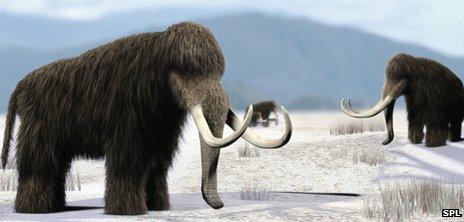Carbon emissions 'will defer Ice Age'
- Published

Human emissions of carbon dioxide will defer the next Ice Age, say scientists.
The last Ice Age ended about 11,500 years ago, and when the next one should begin has not been entirely clear.
Researchers used data on the Earth's orbit and other things to find the historical warm interglacial period that looks most like the current one.
In the journal Nature Geoscience, they write that the next Ice Age would begin within 1,500 years - but emissions have been so high that it will not.
"At current levels of CO2, even if emissions stopped now we'd probably have a long interglacial duration determined by whatever long-term processes could kick in and bring [atmospheric] CO2 down," said Luke Skinner from Cambridge University.
Dr Skinner's group - which also included scientists from University College London, the University of Florida and Norway's Bergen University - calculates that the atmospheric concentration of CO2 would have to fall below about 240 parts per million (ppm) before the glaciation could begin.
The current level is around 390ppm.
Other research groups have shown that even if emissions were shut off instantly, concentrations would remain elevated for at least 1,000 years, with enough heat stored in the oceans potentially to cause significant melting of polar ice and sea level rise.
Orbital wobbles
The root causes of the transitions from Ice Age to interglacial and back again are the subtle variations in the Earth's orbit known as the Milankovitch cycles, after the Serbian scientist Milutin Milankovic who described the effect nearly 100 years ago.
The variations include the eccentricity of the Earth's orbit around the Sun, the degree to which its axis is inclined, and the slow rotation of its axis.
These all take place on timescales of tens of thousands of years.
The precise way in which they change the climate of the Earth from warm interglacial to cold Ice Age and back every 100,000 years or so is not known.
On their own, they are not enough to cause the global temperature difference of about 10C between Ice Age and interglacial. The initial small changes are amplified by various factors including the release of carbon dioxide into the atmosphere as warming begins, and absorption of the gas by the oceans as the ice re-forms.
It is also clear that each transition is different from previous ones, because the precise combination of orbital factors does not repeat exactly - though very similar conditions come around every 400,000 years.
The differences from one cycle to the next are thought to be the reason why interglacial periods are not all the same length.
Cambridge University's Dr Luke Skinner: "If we were trying to avoid an ice-age, we've tried too hard"
Using analysis of orbital data as well as samples from rock cores drilled in the ocean floor, Dr Skinner's team identified an episode called Marine Isotope Stage 19c (or MIS19c), dating from about 780,000 years ago, as the one most closely resembling the present.
The transition to the Ice Age was signalled, they believe, by a period when cooling and warming seesawed between the northern and southern hemispheres, triggered by disruptions to the global circulation of ocean currents.
If the analogy to MIS19c holds up, this transition ought to begin within 1,500 years, the researchers say, if CO2 concentrations were at "natural" levels.
As things stand, they believe, it will not.
Loving CO2
The broad conclusions of the team were endorsed by Lawrence Mysak, emeritus professor of atmospheric and oceanic sciences at McGill University in Montreal, Canada, who has also investigated the transitions between Ice Ages and warm interglacials.
"The key thing is they're looking about 800,000 years back, and that's twice the 400,000-year cycle, so they're looking at the right period in terms of what could happen in the absence of anthropogenic forcing," he told BBC News.
He suggested that the value of 240ppm CO2 needed to trigger the next glaciation might however be too low - other studies suggested the value could be 20 or even 30ppm higher.
"But in any case, the problem is how do we get down to 240, 250, or whatever it is? Absorption by the oceans takes thousands or tens of thousands of years - so I don't think it's realistic to think that we'll see the next glaciation on the [natural] timescale," Prof Mysak explained.
Groups opposed to limiting greenhouse gas emissions are already citing the study as a reason for embracing humankind's CO2 emissions.
The UK lobby group the Global Warming Policy Foundation, for example, has flagged up a 1999 essay by astronomers Sir Fred Hoyle and Chandra Wickramasinghe, who argued that: "The renewal of ice-age conditions would render a large fraction of the world's major food-growing areas inoperable, and so would inevitably lead to the extinction of most of the present human population.
"We must look to a sustained greenhouse effect to maintain the present advantageous world climate. This implies the ability to inject effective greenhouse gases into the atmosphere, the opposite of what environmentalists are erroneously advocating."
Luke Skinner said his group had anticipated this kind of reception.
"It's an interesting philosophical discussion - 'would we better off in a warm [interglacial-type] world rather than a glaciation?' and probably we would," he said.
"But it's missing the point, because where we're going is not maintaining our currently warm climate but heating it much further, and adding CO2 to a warm climate is very different from adding it to a cold climate.
"The rate of change with CO2 is basically unprecedented, and there are huge consequences if we can't cope with that."
Follow Richard on Twitter
- Published17 October 2011
- Published15 February 2011
- Published10 October 2009
- Published17 December 2007